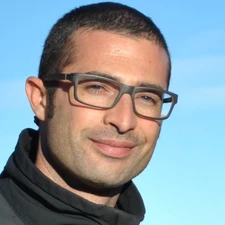Fabio Corbi

TS Tectonics and Structural Geology
The 2018 Division Outstanding Early Career Scientist Award is awarded to Fabio Corbi in recognition of his ground-breaking, multidisciplinary research, dealing both with subduction-related thrust-fault earthquakes and volcano-tectonic processes.
Fabio Corbi developed, tested, and applied new analogue techniques to explore the physics of thrust earthquakes with the ultimate goal to better assess seismic hazards, especially related to mega-earthquakes in subduction zones. His work enables innovative cross-disciplinary research, bridging the gap between space-time scales of m.y., that classically separate slow and distributed regional deformation from rapid and localised rupture processes. After successfully working on a model set-up to perform 2D models, Corbi developed a new 3D experimental set-up to better explore the conditions of asperities synchronization that are able to produce very large earthquakes.
In the past three years Corbi investigated volcano-tectonic processes, motivated by his wide interests and his longer-term goal to better understand the relationships between mega-earthquakes and arc volcanism, including eruptions. To reach this aim, he worked on the conditions controlling eruptive activity at calderas, providing an innovative and successful model that could possibly forecast the location of volcanic activity, and may be applicable to most calderas on Earth.
Even though Corbi strongly focused his research on analogue experiments, his research also relies on field observations numerical models. In addition, he developed a sophisticated statistical method of processing and analysing data that has been shared with several research groups in Europe.
Aside from being a prolific young scientist, Fabio Corbi is also a great mentor of PhD and master students, stimulating outreach activities, organising successful conference sessions, participating in collaborative research projects, and being a very active journal reviewer.
